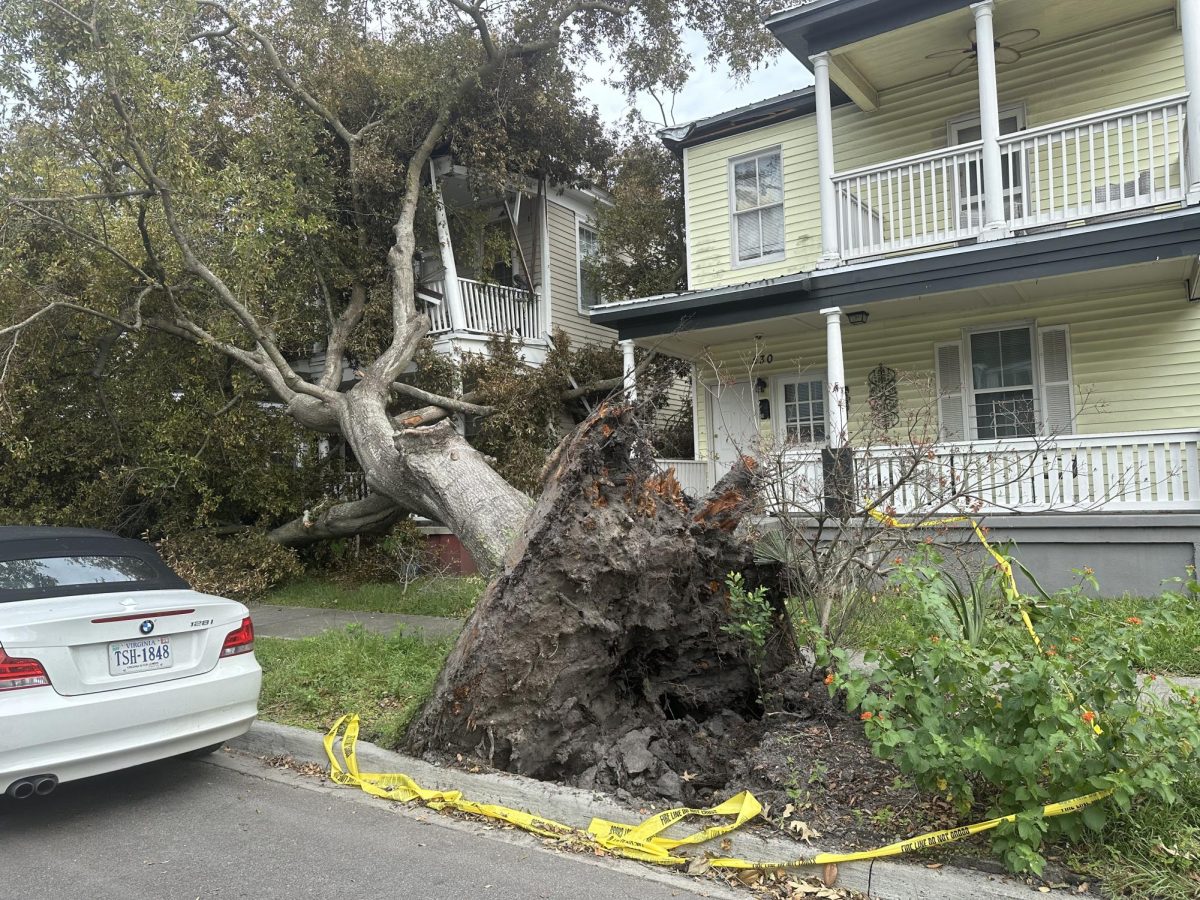
By Llana Samuel, Staff Writer
One of the best things about Savannah and Armstrong in particular, is its lush greenery. Whether the leaves are blocking your path to class during the fall or shading you from the Southern heat in the summer, one would be aware if they were missing.
So why aren’t students noticing that our forests are being destroyed and sold abroad as biomass? It’s simple: we aren’t being told.
According to the Dogwood Alliance, a group that exposes deforestation in order to educate individuals and corporations, “European policy-makers are promoting the burning of Southern forests for electricity to meet their clean energy targets.” Each week, train carriages filled with wood pellets are transported through Savannah to the port where they are then shipped to Europe. Energy giants in Europe, such as Drax Group, use them as biomass fuel for their customers who are oblivious as to where their “clean energy” is truly coming from. This year, the policy makers will meet in Europe to draft their climate change plan for 2030.
“I believe that it is paramount to alert locals about the Our Forests Aren’t Fuel campaign because the EU’s appetite for wood pellets is leading to massive deforestation right in our backyard,” Rita Frost said. Frost is a Texas native who grew up playing in her local woodlands and is now working in Savannah with the Dogwood Alliance to spread the “Our Forests Aren’t Fuel” Campaign.
Many of the local volunteers, mostly students from around the city, are astonished to find out that this process has been going on for years. Frost also pointed out that “we need a global grassroots movement that tackles climate change and its fallout.”
The campaign group, fueled by local environment enthusiasts, has already garnered over 700 signatures for their petition to present to the UK consulate on Trade & Investment in Atlanta and they aren’t stopping there. Plans to present an investigative report at a press conference, as well as a march in Atlanta this spring are already in the works.
For many students, getting into their major program is just as, if not more important than saving southern forests. For some, doing both is equally important.
“As a Law & Society major, I get to use the knowledge I’ve learned to help our local community,” said Armstrong student and campaign intern, Amy Byrne.
Armstrong prides itself on being a green campus not just in scenery, but also in practice, which makes this issue even more important as it is so close to home. The southeast is already the largest exporter of wood pellets in the world.
“With Armstrong being a tight community, it is important that students spread the word and donate a portion of their time to volunteering or signing a petition.” said Byrne.
Despite scientific reports like the one from the World Resources Institute mentioned in the New York Times’ January 28 paper, plants such as the one in Waycross boast carbon neutrality and continue to burn trees releasing even more carbon dioxide into the atmosphere. In fact, over 750,000 tons of wood pellets are shipped through Savannah from the Waycross facility, often unnoticed by locals, each year.
Until European companies are forced to change their environmental practices for obtaining biomass, the conversion of once natural forests into pine plantations across the south for biofuel abroad will sadly continue.
In a region that hosts some of the most diverse ecosystems in its forests, it is only a matter of time before the woodlands in Savannah fall victim to this new industry practice. Thankfully, students and locals across the city are campaigning to have their voices heard by the companies responsible.









CC • Feb 12, 2015 at 8:54 pm
Hi Rebecca, I apologize that my initial response was in itself inflammatory. I am close to this issue and find it disappointing that it receives coverage without consideration of broader concerns. Your response underscores my point which is that clearcut forests, in most cases, are not used to supply the wood pellet industry. Wood pellet feedstock is largely coming from sawmill residues and forest thinnings which are available regardless of wood pellet industry existence. Georgia’s demand for pulpwood, the forest material used to create wood pellets, is actually not changing, because the previous dominant demand source for pulpwood, the pulp and paper industry, is on the decline. The US Forest Service reports that Georgia’s growth-to-removal rate is actually positive, harvesting 19 million tons LESS than is grown each year, resulting in growth exceeding removals by 38%. Georgia has more forests today than it did 75 years ago. How does that jibe with the statement that “our forests are being destroyed?” It is not at all a stretch to say that the wood pellet industry makes timber more valuable and promotes landowners to plant trees in lieu of agriculture or development which of course promotes increased carbon uptake. The idea that trees as carbon sinks will never be touched and left to grow forever is utopian. Do you live in a home built with lumber, use furniture carved from timber, blow your nose into a tissue produced from pulp, or write on paper? The forest products industry makes forests valuable and promotes, rather than degrades, the area of forestland in a region. The wood pellet industry is just one more piece of that puzzle.
I cannot argue with you about the amount of GHG emitted via biomass. I never once in my response implied that biomass GHG is negligent or even remotely preferable to superior alternative energy sources. My point was simply to say that it is at least modestly preferable to the burning of coal, a fossil fuel, which is not anywhere close to sustainable / renewable. I agree with you that it is a poor long-term solution, but I would ask you to consider whether it is truly worse than extracting and burning coal. All I ask is for you to consider the possibility that this is potentially a reasonable stop-gap until better, more sustainable sources of energy are feasible on a large scale. I, like you, don’t want to breathe terrible air nor do I want to destroy the environment.
I hope the dialogue can continue with at least the acknowledgement that Georgia’s forest area is not plummeting and burning pellets is not worse than burning coal.
CC • Feb 6, 2015 at 2:43 pm
The EU’s practices are an effort to reduce reliance on fossil fuels and while far from perfect, the burning of wood pellets does promote use of a sustainable resource for electricity. Timber, unlike coal, also absorbs carbon throughout its life. Much of the supply used to create pellets comes from forest thinnings and residuals from sawmills. I believe the percentage of US South timber going into the production of wood pellets is far less than your article implies. Perhaps do a little more research before putting out an inflammatory article. It is helpful to understand both sides of this issue.
Rebecca Lakewood • Feb 11, 2015 at 8:24 pm
CC- The EU’s practices are a misguided effort to be sustainable. You’re right, wood does absorb carbon throughout its life. However, burning it and putting it into the atmosphere (not even counting the entire process of cutting down the tree, putting it on a truck, processing it, and sending it all the way across the ocean to UK) is like setting off a carbon bomb in the atmosphere for 30-50 years after it is burned. So not only does using trees as fuel take away one of our best carbon sinks, it also increases the amount of GHG in the atmosphere when we need to be limiting those toxic chemicals right now. Every year, Georgia exports close to a million metric tons of wood pellets- that’s one more million than needs to be sent. Our forests aren’t fuel. Llana did amazing research for the article, maybe you should too before you respond so negatively. She’s backed up by over 85 scientists who sent a letter to the EPA concerning biomass AND over 75 environmental non-profits who have the public’s best interests in mind.
Check out these sources: http://www.nytimes.com/2015/02/11/business/economy/a-biofuel-debate-will-cutting-trees-cut-carbon.html?mwrsm=Email&_r=1
http://grist.org/climate-energy/europe-is-burning-our-forests-for-renewable-energy-wait-what/
http://www.forbes.com/sites/tomzeller/2015/02/01/wood-pellets-are-big-business-and-for-some-a-big-worry/
http://www.motherjones.com/environment/2014/08/why-europe-burning-us-forests-renewable-energy
http://www.bloomberg.com/news/articles/2015-02-03/scientists-seeking-to-save-world-find-best-technology-is-trees
http://www.nytimes.com/2015/01/29/science/new-report-urges-western-governments-to-reconsider-reliance-on-biofuels.html?hp&action=click&pgtype=Homepage&module=first-column-region®ion=top-news&WT.nav=top-news